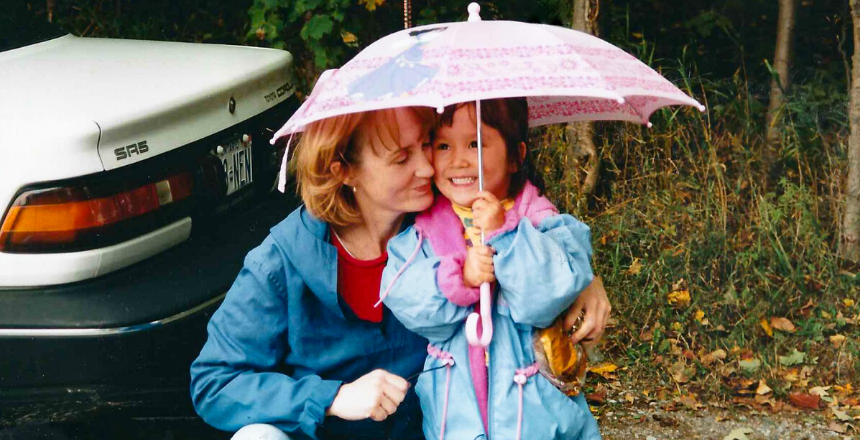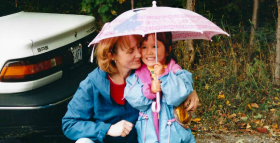
Anna and her mother traveling in Ontario in an undated photo
I’ve had a hard time looking at myself in the mirror ever since my mom died—I don’t recognize my reflection.
For someone with a single ethnic identity, though there are always exceptions, their claim to their racial background typically lies in their appearance. For a mixed race person, that claim to culture rests on the ethnicity of their parents. Rather than conversations about race stopping at “What is your background?”—to which I respond “Korean-Canadian”—the next question is typically, “Which parent is Korean?” The conversation pivots uncomfortably when I say that my white mom is dead, in other words—I’ve lost my claim to whiteness.
Within days of my mom’s death after a sudden brain aneurysm, I could feel my identity had changed. A previous brain aneurysm at the age of 40 had left her partially paralyzed, and for the 15 years that followed, I was her caregiver. Now, waking up and not making her breakfast was a daily reminder that I’d lost my sense of purpose. As months passed, the loss of my relational identities—as a caregiver and daughter—felt less foreign, but another identity crisis emerged.
“Where did you adopt her from?” People would ask my blue-eyed, fair-skinned (and biological) mom as she pushed me—a pudgy baby with slender brown eyes and dark brown hair—in my stroller. Throughout her single parenting, she did her best to expose me to the heritage of my absent Korean father who had opted out of raising me. She enrolled me in Korean language night classes and read me Korean folktales in English. But all of this was little more than a curiosity to me. I felt more comfortable having crumpets with maple syrup on Christmas morning than kimchi. Of all the Disney princesses, I loved dressing up as Mulan. But it was because I’d idolized the blonde-haired Christina Aguilera singing ‘Reflection’ on the soundtrack.
As a person of mixed ethnicities who was raised by my white mom in predominantly white environments, I’ve always felt that I was white. All the stereotyping and bullying reminded me that I don’t look as I feel. But by consistently downplaying my race card in an attempt to belong in majority-white environments, I now feel “too white” to fit in among people of color. What has resulted is racial imposter syndrome—the feeling that I can’t truly claim either racial identity, and grief has only made it worse.
Sarah Elizabeth Gaither, professor of psychology and neuroscience at Duke University, said in an NPR interview, “Being constantly told that you never fit into your respective racial backgrounds…it makes you feel like you don’t have a family, that you don’t have a group to call your own.” I’ve always felt this way, but now, without my nuclear family of one to come home to, I’ve lost any feeling of connection to my roots.
“This loss has impacted my conversations about race because it inevitably touches on my identified racial identity,” psychotherapist Lena Franklin tells me on navigating her own mixed race identity since losing her Vietnamese mom. “The hollowness within my heart isn’t just a yearning for my mother to be here in physical form, it’s an identity loss connected to a racial, ancestral lineage.”
There have been moments in my grief when I’ve envied people of color who have clearly defined ethnic communities from which they can seek support.
While losing my physical claim to whiteness has been disorienting, my privileged upbringing has protected me from fearing excessive surveillance or violent oppression on a daily basis. Other grieving people with mixed ancestry aren’t so fortunate: say their white parent dies in an intolerant community, for example, they might feel and actually be more unsafe because of it. But I’ll admit, there have been moments in my grief when I’ve envied people of color who have clearly defined ethnic communities from which they can seek support.
In some ways, both growing up with racial imposter syndrome and having a mom with a disability prepared me for grieving in a grief-avoidant culture—I’m no stranger to existing outside the dominant narrative. The many times I’ve attempted to remedy others’ curiosity about “where I’m really from” make the dead mom conversations feel like a breeze. But all of these exchanges leave me with the same heartache: the painful reminder that the one person who I never felt like I needed to prove my ethnicity to, is gone. And so is the foundation of my cultural identity.
Grief, much like ability, sexuality, and race, is an identity we carry. It’s not something we asked for nor something we can easily change. My hope is that one day I no longer feel the need to make other people comfortable, about my grief or my ethnicity. That one day, I can look at myself in the mirror and see a complex human being who wears many identities, none of which require explanation.
Anna Haines is a lifestyle writer and photographer. You can see more of her work at annahaines.org and follow her travels (and grief ramblings) on Instagram @annarosalie.








